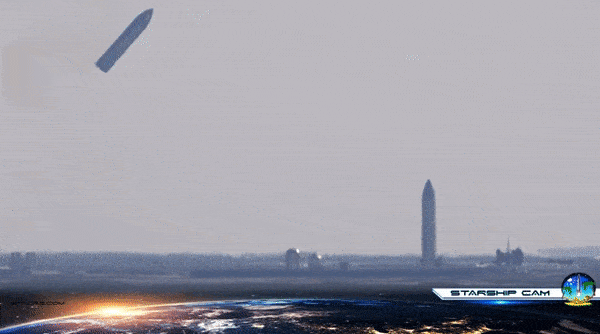SpaceX is preparing to rocket its latest Starship prototype tens of thousands of feet into the air as early as this week.
The challenge is landing it back on the ground – that maneuver has ended in explosion both times the company previously attempted it. This time around, SpaceX founder Elon Musk estimated that the prototype has a 60 percent chance of a successful landing.
The prototype represents the upper stage of a two-part system: Eventually, a roughly 23-story booster called Super Heavy would heave the Starship spaceship toward orbit. Musk's long-term vision is for the system to one day fly astronauts to the moon and power hypersonic travel on Earth. He has said he plans to build 1,000 Starships in order to carry people and cargo to Mars.
But first, SpaceX has to figure out how to land the rocket, since that is critical to making the system reusable. Full reusability could help Starship slash the cost of reaching space 1,000-fold.
The newest prototype is called Starship serial No. 10, or SN10. It's not yet clear precisely when SpaceX plans to attempt its test flight, but Musk said on Sunday that there's a "good chance" of launch this week.
When that happens, SN10 will roar tens of thousands of feet above SpaceX's facilities in Boca Chica, Texas. One by one, it should shut off its engines as it nears the peak of its flight, then flip sideways and plummet back to Earth in a controlled belly flop. As it nears the ground, the rocket should fire its engines once again to flip itself upright in time to slow its descent and touch down gently on the landing pad.
The last two times SpaceX conducted such a flight, the prototypes slammed into their landing pads and exploded.
SPadre.com captured the second incident from a camera on top of a building about 10km away:

Before this upcoming launch, SpaceX needs to conduct a static fire to test the rocket's engines, but the company appears to have all the government clearance it needs for launch. That includes a launch-license approval, local road closures, and airspace closures.
The Federal Aviation Administration has issued airspace-closure notices for the area from 8 am to 6:30 pm CT on Thursday, Friday, and Saturday. Cameron County, Texas, has also issued a Boca Chica road-closure notice from 9 am to 6 pm CT for Thursday. However, road and airspace closures can be canceled and rescheduled over and over until SpaceX is actually ready to launch.
We will update this post once SpaceX confirms the timing of its launch attempt.
SpaceX faces regulatory hurdles to get Starship to orbit
SpaceX's two previous test flights – those of prototypes SN8 and SN9 – were considered successes despite their explosive endings. That's because they demonstrated that Starship is capable of rocketing to suborbital heights and then controlling its fall.
However, those flights both resulted in FAA investigations, since the agency wanted to determine the cause of the explosions. It turned out that SN8 had fallen victim to low pressure in a propellant tank, which caused the spaceship to fall too fast and slam into its landing pad.
An additional issue with that attempt was that SpaceX hadn't gotten the proper FAA approval, violating its launch license.
This triggered its own investigation, which then held up the SN9 flight. Once that prototype did fly, one of its three Raptor engines failed to relight as the rocket neared the ground.
All those investigations have been closed, an FAA spokesperson told CNN reporter Jackie Wattles. And the launch-license updates for the SN10 flight are approved, according to Washington Post reporter Christian Davenport.
Eventually, SpaceX will want to rocket a Starship into orbit to test its ability to reenter Earth's atmosphere. That will require a different type of FAA license, but obtaining it means clearing many regulatory hurdles, including a thorough environmental assessment.
(The environmental impact statement SpaceX previously completed for Boca Chica launches focused on the company's smaller rockets, rather than its much larger Starship-Super Heavy system.)
The company is now waiting to start that environmental assessment, but depending on the findings, it's possible SpaceX may need to conduct a new impact statement, which could take up to three years.
Complicating matters is a leaked FAA draft document, obtained by Insider, which revealed that SpaceX plans to dig natural gas wells in Boca Chica to fuel Starships and power plants. Such plans could also affect SpaceX's environmental review process.
This article was originally published by Business Insider.
More from Business Insider:
#Space | https://sciencespies.com/space/spacex-is-about-to-attempt-another-starship-launch-the-last-two-exploded/
No comments:
Post a Comment